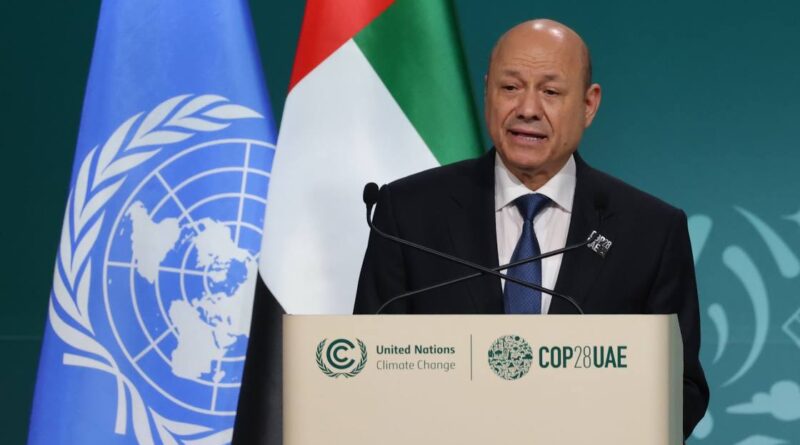COP28: Paris Agreement goals are not being met
In 2015, during COP21, nearly 200 countries signed the Paris Agreement, a landmark treaty that injected fresh momentum into the fight against climate change. Its primary objective was to limit global warming to 1.5°C. However, eight years later, the path remains arduous, and hopes are dwindling. As COP28 kicks off in Dubai on November 30, it prompts a critical evaluation of the Paris Agreement’s status and effectiveness.
The COP28 is anticipated to be the most significant gathering since the inception of the Paris Agreement. The window to contain global warming to 1.5°C is rapidly narrowing, especially as countries are far from fulfilling their commitments under the accord. Adopted during COP21 in 2015, the treaty aimed to limit the average global temperature increase to well below 2°C compared to pre-industrial levels, with an ambitious target of 1.5°C by the year 2100. This marked a pivotal moment in the climate battle, as, during COP21, global economic policies were steering the world towards a 3.5°C warming by 2100, compared to the pre-industrial era, according to the International Energy Agency (IEA) at that time.
Today, the climate commitments made by countries worldwide set the planet on a trajectory of warming ranging from 2.5 to 2.9°C over the course of this century, as evaluated by the United Nations Environment Programme (UNEP) in its annual report released just before COP28. While an improvement, it falls significantly short. Global emissions reached new records in 2022, rising by 1.2% over the 2021-2022 period to peak at 57.4 gigatonnes of CO2 equivalent, as stated in the document.
Insufficient Ambitions: Evaluating Current Climate Commitments
“The goals are not being met,” laments Marine Pouget, the climate international governance manager at Réseau Action Climat. According to a report from the UN Climate Change (UNFCCC), current commitments from countries project a mere 2% reduction in emissions between 2019 and 2030, instead of the recommended 43% to limit warming to 1.5°C.
COP28 aims to conduct a first global assessment of the commitments made by the 195 signatories of the Paris Agreement to reduce emissions. These commitments, known as “Nationally Determined Contributions” (NDCs), need regular updates to align with the Paris Agreement’s goals.
While most countries have submitted their NDCs, some did so only last year, notes Marine Pouget, emphasizing that national action plans often fall short of the objectives set in the 2015 agreement. “Most NDCs are not more ambitious than before,” she laments, adding that the announced plans are “not necessarily implemented.” “There is a difference between what is announced and what is actually done. Even if we take them into account, we still exceed 2°C,” she concludes.
The UNEP estimates the likelihood of limiting warming to 1.5°C by 2100 at only 14%, even under the most optimistic scenario.
Accelerated Warming and Financial Battles
A recent study in Nature Climate Change suggests that there may be less time than anticipated to contain warming. At the current pace of carbon emissions, around 40 billion tonnes annually, there are approximately six years left before the 1.5°C warming threshold is breached, as summarized by Agence France-Presse (AFP).
Since the industrial era, the planet has already warmed by an average of 1.2°C. The latest estimates from the Copernicus European observatory indicate that the +1.5°C threshold could be reached by 2034, not mid-century as envisaged by global climate policies, echoing the agency’s findings.
Copernicus also announced that the 2°C warming limit was exceeded for the first time on November 17, with global temperatures being 2.07°C above the 1850-1900 average, according to the Copernicus Climate Change Service (C3S).
The looming question remains: Why is progress elusive? Marine Ponget emphasizes the gaps in the Paris Agreement, particularly its silence on fossil fuels, the primary source of greenhouse gas emissions globally.
Moreover, the Paris Agreement faces the “UN limitations,” as Marine Pouget believes, highlighting that the treaty remains at the mercy of each country’s government. “As long as the government does not decide to implement it in national legislations, there is no obligation for their commitments to be put into practice.”
France’s incorporation of the Paris Agreement into national laws is what allows legal action against the state for climate inaction, she points out. “The French state has not complied with the laws it has put in place to implement the Paris Agreement, and thus, we can file a complaint against the state,” she notes, referring to the legal proceedings initiated by the collective Notre Affaire à tous.
Financial Disputes: A Core Climate Battle
A significant point of contention revolves around financial agreements. Historically, wealthy nations have been the major contributors to greenhouse gas emissions, compared to developing countries that bear the brunt of climate change consequences. In 2009, rich nations pledged to provide $100 billion annually to developing countries for climate action by 2020. This financial support was reiterated in the Paris Agreement.
According to the Organisation for Economic Co-operation and Development (OECD), the $100 billion target is “likely” to have been achieved with a two-year delay, in 2022, based on “preliminary and yet-to-be-verified data.” In 2021, climate aid amounted to $89.6 billion.
Established in 2009, this amount pledged by wealthy nations is outdated. “By 2025, it is estimated that developing countries will have investment needs related to climate action of about USD 1 trillion, and this figure will increase to about USD 2.4 trillion per year between 2026 and 2030,” notes Mathias Cormann, Secretary-General of the OECD, in the report.
The financing of climate transition, a perennial source of tension at each climate rendezvous, will once again take center stage at COP28, commencing on November 30. The success of this meeting must match the ambitions of the Paris Agreement; otherwise, the 1.5°C target will slip away for good. The window of opportunity is narrowing. “The upcoming COPs are the last climate plans that can genuinely save the 1.5°C,” warns Marine Pouget.




